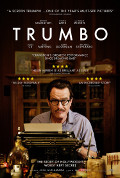
Directed by
Jay Roach
124 minutes
Rated M
Reviewed by
Chris Thompson

Trumbo
Synopsis: In 1947, Dalton Trumbo (Bryan Cranston) was Hollywood’s top screenwriter. He was also a member of the American Communist Party which made him a target for powerful right wing gossip columnist, Hedda Hopper (Helen Mirren), the President of The Motion Picture Alliance for the Preservation of American Ideals, John Wayne (David James Elliot), and, ultimately, J. Parnell Thomas (James DuMont) of the House Committee on Un-American Activities. Refusing to name names, Trumbo was sent to jail for contempt of Congress and found himself blacklisted as one of the infamous ‘Hollywood 10’. Desperate to work and determined not to give in to the government or the studio heads, Trumbo and his colleagues began producing scripts that were then ‘fronted’ by non-blacklisted screenwriters. And then those scripts started winning Oscars.
Despite Bryan Cranston’s stand-out performance in the title role, Trumbo is as much, if not more, about a shameful period in American political history as it is about the man himself. As such, director Jay Roach (best known for his comedies Meet The Parents and Meet The Fockers) provides us with a very good re-creation of 1950s America in the grip of McCarthyism. Using a combination of present-day recreations intercut with or spliced into black and white archival imagery, the rule of thumb seems to be that if a famous face isn’t germane to the Trumbo story – Ronald Reagan, Humphrey Bogart, Robert Taylor and so on - then we get to see the real thing, whilst those who form part of the story – such as Edward G. Robinson (Michael Stuhlbarg) Kirk Douglas (Dean O’Gorman) and Otto Preminger (Christian Berkel) – are played by actors. For the most part it works although at certain key moments it tends to distract.
This is not the first time the story of the Hollywood 10 has been tackled on film. Martin Ritt, himself blacklisted from working in television, directed The Front (1976) which, though fictionalised and told in a lighter, sometimes comic, tone, achieved some great moments of drama and pathos which seem to be beyond the grasp of Roach. The opportunities certainly existed – the death of one friend, betrayal by another, and abandonment by colleagues – but the potential emotional power of these moments is glossed over in favour of them forming key parts of a story that is told in the ‘this happened, then this happened, then this happened’ style.
Where we do find the human and emotional elements coming to the fore are within Trumbo’s family who bear the brunt of the consequences of his actions. Maybe not so much in the guise of his wife, Cleo – a pretty thankless role for Dianne Lane whose talents are a bit wasted in numerous scenes of her looking on in a supportive wifely way – but in the relationship he has with his eldest daughter, Niki played as a child by Maddison Wolfe and then as a teenager by Elle Fanning. Fanning is outstanding in the role finding a depth of character that is one of the real strengths of the film (there’s also a nice moment of archival footage of the real Trumbo talking about his debt to Niki in the closing credits). The surprise standout, though, is comedian Louis C. K. as Trumbo’s friend and fellow screenwriter, Arlen Hird. It’s a touching, quiet performance that embodies the conflicts of risking everything with not much more than your principles in order to stand up to a powerful government.
With some handsome production design from Mark Ricker and a cool, sometimes jazzy, soundtrack by Theodore Shapiro, Trumbo looks and sounds good and Cranston’s performance, whilst sometimes over the top, is nevertheless enjoyable.
The irony, of course, is that Trumbo’s ‘fronted’ screenplays for Roman Holiday (1953) and The Brave One (1957) both garnered Oscars, the first in the name of real writer, Ian McLellan Hunter (Alan Tudyk) and the second in the fictitious name of Robert Rich. It was this fabrication that eventually provided the trigger for Trumbo to reveal the truth and in 1960 to finally see his own name back in the credits for Stanley Kubrick’s Spartacus and Otto Preminger’s Exodus.
As a document of an important story in a difficult time (albeit with some controversial ‘sweetening’ of Trumbo’s true character) the film resonates with some of the contemporary issues concerning the trade-off of personal liberties for national security. But as an insight to the life of a great screenwriter and a complex character, John McNamara’s screenplay doesn’t go deep enough to move. One can’t help but wonder what a writer of Trumbo’s calibre would have done with this story.

Want more about this film?


Want something different?




